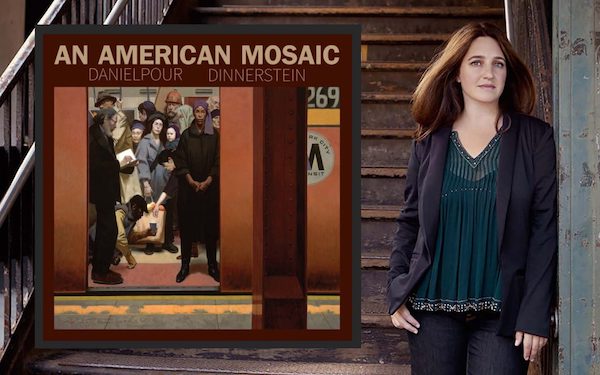Classical Album Review: Richard Danielpour’s “An American Mosaic” — A Potent Reminder of Shared Humanity
By Jonathan Blumhofer
An American Mosaic is a fascinating study of how a contemporary composer can fuse the gestures and syntax of a tradition rooted in Bach with contemporary sensibilities.

Pianist Simone Dinnerstein and An American Mosaic.
There’s an extra element of risk involved any time a composer refers too closely to current events in their music. The proximity of experience sometimes seems to undercut the music’s ability to transcend the moment of its creation and, as a result, it doesn’t gain lasting traction. That’s one reason why, on the concert stage at least, only Richard Strauss’s Metamorphosen — a lament to the cultural destruction wrought by World War 2 — has entered the wider repertoire; Metamorphosen was premiered in 1946.
Admittedly, it’s an odd predicament. Music is deeply personal, after all, and composers are subjective as anyone else. So, it’s heartening that Richard Danielpour’s An American Mosaic (Supertrain Records) doesn’t shy away from these challenges. A fifty-minute-long solo-piano piece, Mosaic serves as both a meditation on the coronavirus pandemic and a tribute to various heroes of the last year-plus — from caretakers and physicians to parents, ministers, teachers, and journalists.
It’s an affecting effort.
Danielpour’s writing is at once decidedly abstract but also highly accessible. His harmonic language is essentially diatonic. He doesn’t shy away from writing tunes. There’s a healthy appreciation for the canon and convention in his language, but it never comes across as derivative or old-fashioned.
Quite the contrary: Mosaic is a fascinating study of how a contemporary composer can fuse the gestures and syntax of a tradition rooted in Bach with contemporary sensibilities.
Cast in three large parts, Mosaic is framed by, respectively, a Prologue and an Epilogue. As signposts dividing the piece into thirds come a pair of Interludes.
They’re all related. The Prologue introduces a monodic theme that’s punctuated by tolling, bell-like chords that are suddenly cut off. The first interlude transforms the Prologue’s theme into a two-part invention; the second reworks it into a three-voice fugue. For the Epilogue, the materials are further crafted into a four-part chorale; at the end, the tolling bell gesture recurs.
Between these essentially meditative structural moments come sequences of tributes.
The first and third groups are devoted to pairings of individuals and professionals. Some of the music matches with its dedicatees more obviously than others. The connections between the energetic, spirited lines in “Parents & Children” and the spunky, off-kilter riffs in “Teachers & Students” seem self-evident. So do the cantorial figures in “Rabbis & Ministers” and the bluesy refrains of “Prophets & Martyrs” (a tribute to African-American lives lost during the pandemic).
What to make of the amiable, Bernstein-esque episodes of “Caretakers & Research Physicians”? Or the serene, lullaby-like writing in “Doctors & Interns”? Well, that leaves something to the imagination.
So does Mosaic’s central part, which includes music specifically alluding to the coronavirus (“The Invisible Enemy”) and the Trump Administration (“The Visible Enemy”). How does one interpret the knotty, low-register writing and seeming-Copland quote of the latter? Or the pulsing, meandering melodic lines of the former? That’s part of the adventure of engaging with this music.
Danielpour wrote the piece last year for pianist Simone Dinnerstein, who premiered it at the Oregon Bach Festival in December (via live stream). She proves a persuasive advocate for his music, playing with warmth and color — not to mention vigor in the handful of brisk movements. Dinnerstein’s voicing of Danielpour’s contrapuntal writing, in particular, shines.
Dinnerstein also impresses in the closing sequence of Bach arrangements Danielpour wrote for her that round out the disc: two movements from the St. Matthew Passion (the chorale “Wenn ich einmal soll scheiden” and the final chorus) and one from the B-minor Mass (the Agnus Dei). Together, these anchor Mosaic — and our larger social situation — within a bigger historical context. The album thus stands as a potent reminder of shared humanity and lived experience: a statement of real urgency, timeliness, and approachability.
Jonathan Blumhofer is a composer and violist who has been active in the greater Boston area since 2004. His music has received numerous awards and been performed by various ensembles, including the American Composers Orchestra, Kiev Philharmonic, Camerata Chicago, Xanthos Ensemble, and Juventas New Music Group. Since receiving his doctorate from Boston University in 2010, Jon has taught at Clark University, Worcester Polytechnic Institute, and online for the University of Phoenix, in addition to writing music criticism for the Worcester Telegram & Gazette.
Tagged: An American Mosaic, Richard Danielpour, Simone Dinnerstein
